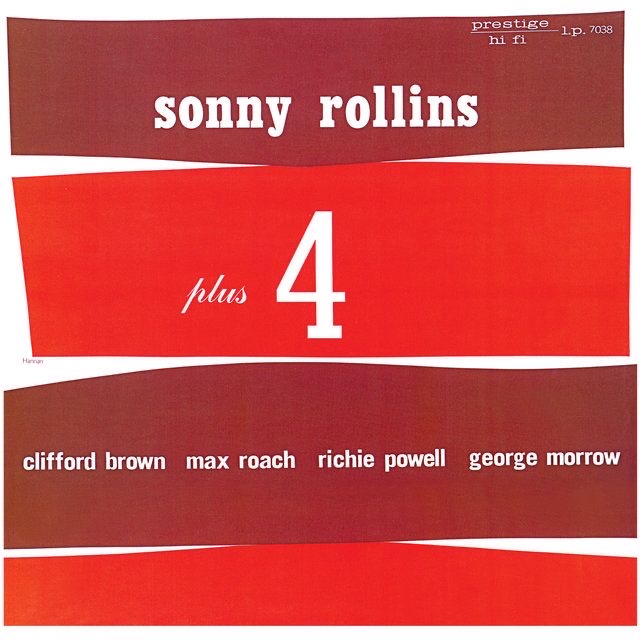Dive into the Power & Passion of ‘Tenor Madness
In the vast panorama of jazz, Sonny Rollins’ “Tenor…
“Plus 4” by Sonny Rollins is a classic album that captures the spirit of the mid-1950s jazz scene. Recorded in Rudy Van Gelder’s living room on March 22, 1956, the album features Sonny Rollins on tenor saxophone, Clifford Brown on trumpet, Richie Powell on piano, George Morrow on bass, and Max Roach on drums. The album is a perfect example of the hard bop style, which emphasizes a strong, swinging rhythm section, blues-based improvisation, and catchy, memorable melodies.

Listening to the vinyl version of “Plus 4” is an experience like no other. As the needle hits the groove, the sound of the band fills the room with a warmth and clarity that can only be achieved through vinyl. The quietness of the vinyl allows the listener to fully immerse themselves in the music, to hear every note and every nuance of the musicians’ performances.
Sonny Rollins is the driving force behind “Plus 4”, and his playing on the album is nothing short of incredible. His robust, full-bodied tone and strong sense of rhythm make him a force to be reckoned with. Rollins takes risks with his improvisations, pushing the boundaries of the harmony and rhythm and creating exciting, unexpected moments of tension and release. His solos on tracks like “Pent-Up House” and “Valse Hot” are masterful, showcasing his technical virtuosity and his ability to create memorable and emotionally compelling improvisations.
Clifford Brown is another standout musician on the album, bringing his signature trumpet sound to the mix. Brown’s solos on tracks like “Count Your Blessings” and “I Feel a Song Coming On” are lyrical and soulful, showcasing his ability to create memorable melodies and express deep emotion through his playing. Richie Powell’s piano playing is also a highlight of the album, bringing a touch of Bud Powell’s influence to the mix while also remaining his own man.
Three songs from the album that stand out are “Valse Hot”, “Count Your Blessings”, and “Pent-Up House”. “Valse Hot” is a jazz waltz that features an introductory interlude before the main melody, and Rollins and Brown take turns swinging tenderly around the floor. Richie Powell and Max Roach also deliver standout solos on the track. “Count Your Blessings” is a medium bounce that allows Rollins to stretch out on the melody with his tenor sax, while Powell provides an interlude to keep the momentum going. “Pent-Up House” is a Rollins original that features Brown and Rollins playing pat-a-cake with the lead figures of the melody line. Brown is in warm form throughout the track, delivering a heartfelt and searching solo, while Morrow and Roach keep the rhythm section swinging hard.
Sonny Rollins’ sound on “Plus 4” is a classic example of the hard bop style, which emphasizes a strong, swinging rhythm section, blues-based improvisation, and catchy, memorable melodies. Rollins’ playing on the album is marked by his technical virtuosity, his sense of adventure, and his ability to create memorable and emotionally compelling improvisations. His sound on “Plus 4” remains a benchmark of the hard bop style, and a key influence on generations of jazz musicians who have followed in his footsteps.
The album was praised for its strong, swinging rhythm section, catchy melodies, and virtuosic solos by the musicians. However, the tragic deaths of Clifford Brown and Richie Powell just a few months after the album’s release cast a shadow over the jazz world. Brown and Powell’s deaths were a devastating loss to the jazz community, and their legacy continues to be celebrated and remembered to this day. The impact of their deaths was felt especially strongly in the world of hard bop, which they helped to define and popularize.
Despite the tragedy surrounding “Plus 4”, the album remains an important and influential recording in the history of jazz. Its mix of hard bop and swing, catchy melodies, and virtuosic solos set a new standard for the genre and helped to define the sound of the mid-1950s jazz scene. The album’s influence can be heard in the work of countless jazz musicians who have followed in the footsteps of Rollins, Brown, Powell, Morrow, and Roach.
In conclusion, “Plus 4” by Sonny Rollins is a classic album that captures the spirit of the mid-1950s jazz scene. The album’s blend of hard bop and swing, catchy melodies, and virtuosic solos set a new standard for the genre and helped to define the sound of the era. Rollins’ playing on the album remains a benchmark of the hard bop style, and his influence on generations of jazz musicians cannot be overstated. The album’s enduring appeal and its importance in the history of jazz make it a must-listen for anyone interested in the genre.